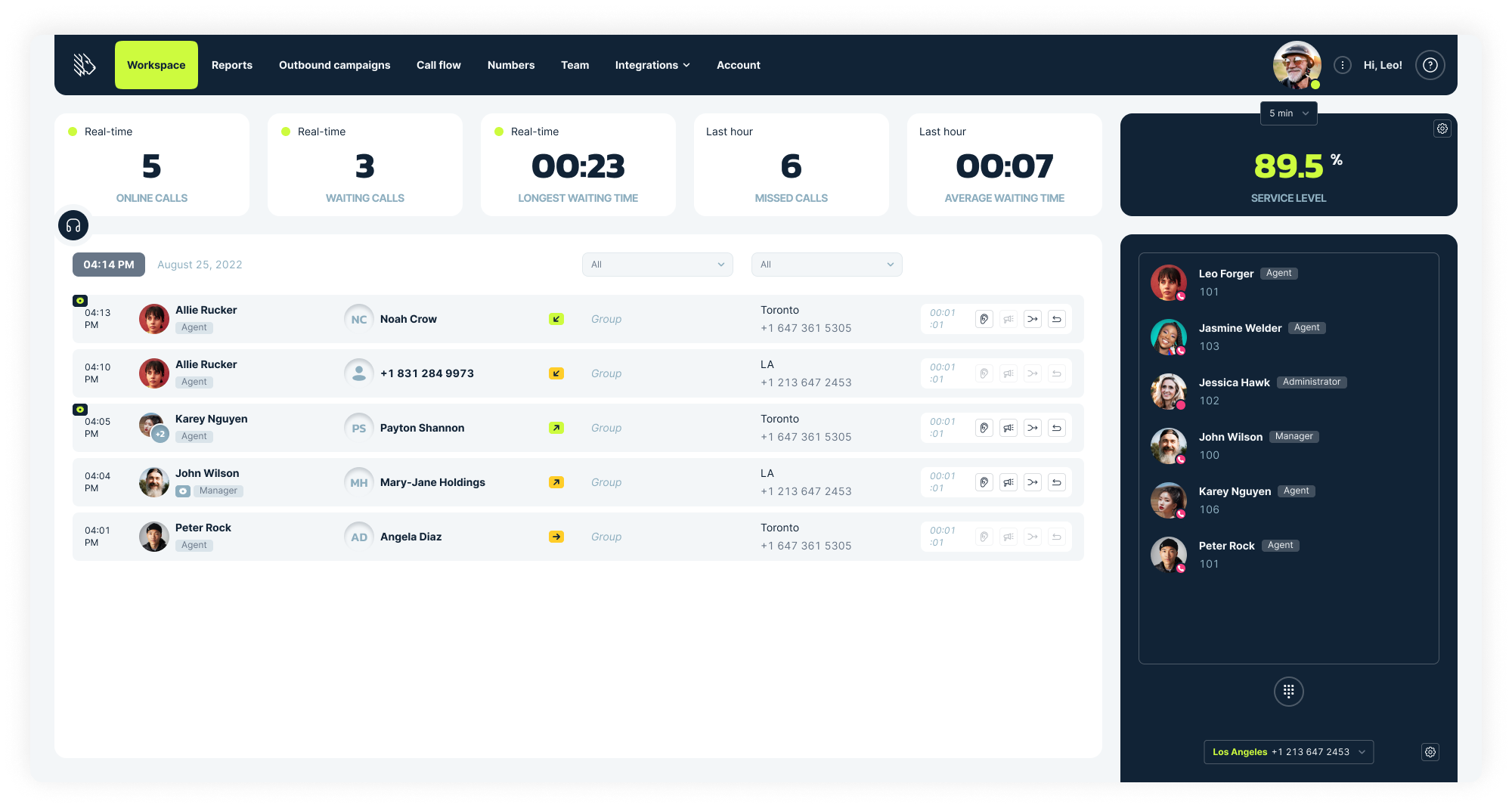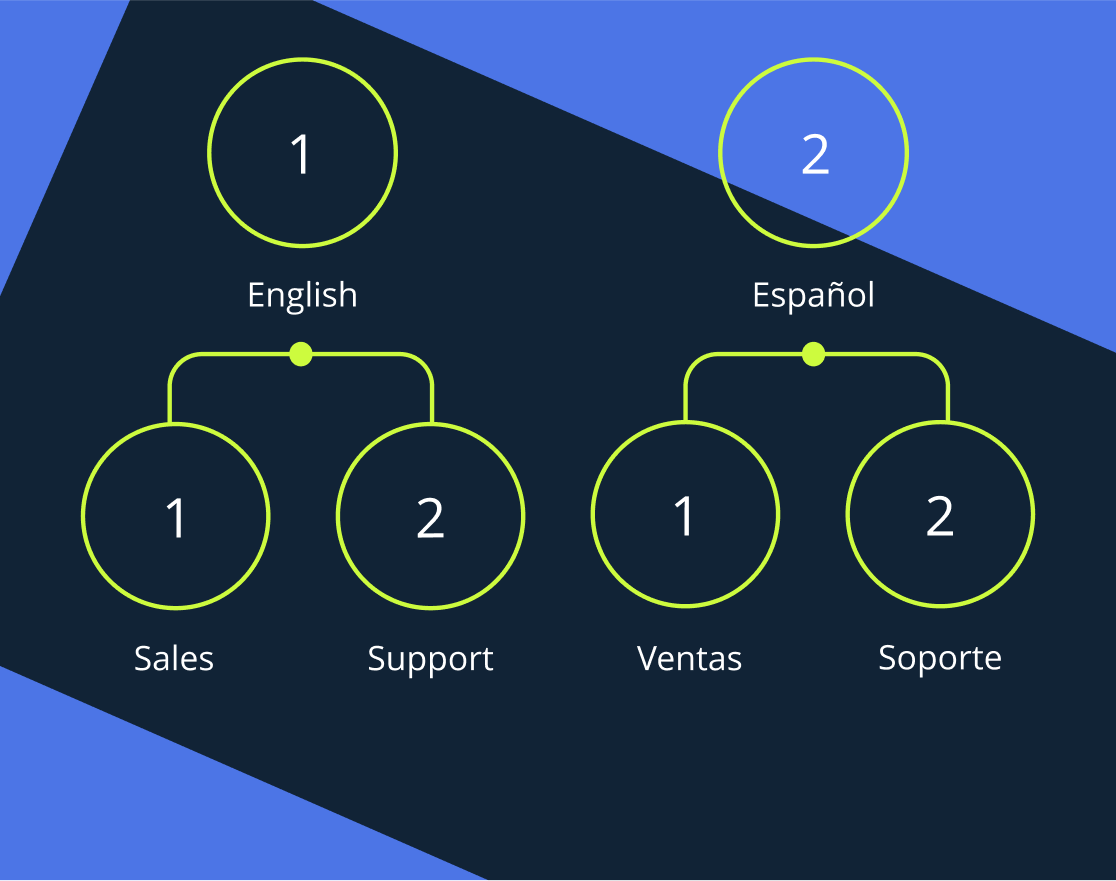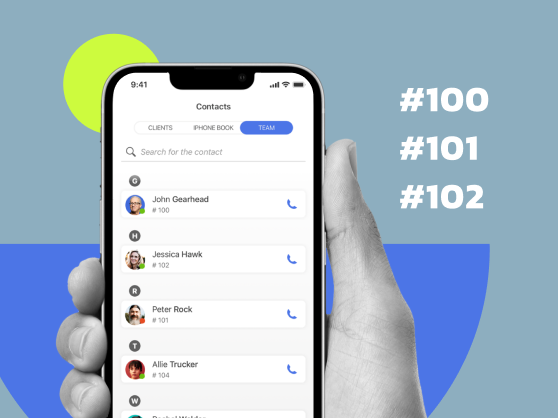Welcome to the comprehensive guide to contact center training. In today’s competitive business landscape, call center agent skills are a crucial differentiator. This guide covers the importance, types, benefits, tracking metrics, training methods, and best practices for implementing call center training. We will also explore impressive training ROI statistics and recommend top-notch training courses. With a proper training program, your agents can provide exemplary customer service and significantly contribute to your business’s growth and success. Let’s delve into creating a highly skilled call center team.
- What is call center training?;
- Importance of call center training;
- Types of call center training;
- Benefits of call center training;
- How to track the efficiency of your call center training program;
- The basic call center training methods;
- Top call center training strategies;
- Best practices for training call center agents;
- Call center training ROI;
- Call center agent training statistics;
- Best call center training courses;
- Train your call center agents to deliver high-level customer service.
What is call center training?
Call center training program is the specialized instruction aimed to empower customer service agents with essential skills and in-depth knowledge. It sharpens their abilities in areas like effective communication, troubleshooting, product familiarity, and managing challenging conversations, enhancing the overall customer engagement and satisfaction
Importance of call center training
For call center agents
Customer service training is not just essential but also transformative, both for call center agents and the business itself. Let’s examine how:
Addressing skill gaps:
Training provides an opportunity for agents to enhance their technical and soft skills along with phone etiquette. This includes improving communication techniques, learning about new product updates, and understanding customer behavior. It ultimately leads to agents becoming more efficient and confident in their roles.
Mitigating job dissatisfaction:
A well-trained call center agent is likely to experience increased job satisfaction. Understanding how to handle various scenarios and resolve customer issues effectively reduces stress and enhances job fulfillment.
Overcoming career stagnation:
Regular contact center learning can open up avenues for career advancement in the organization. Agents can take on more complex roles, enhancing their career prospects and contributing to the organization.
For business
Reducing negativity in customer relations:
Trained agents can handle customer queries and complaints more efficiently, leading to higher customer satisfaction levels. This directly influences customer loyalty and business reputation.
Fixes operational inefficiency:
Call center training programs help reduce errors and refine processes, contributing to overall operational efficiency. This can have a positive impact on service levels and response times, thus increasing productivity.
Lower staff turnover:
When agents receive continuous training and career development opportunities, it reduces staff turnover. Maintaining a stable, knowledgeable team saves on costs associated with recruitment and new staff training.
Types of call center training
Training comes in many flavors, each catering to specific needs and skill sets. Here’s a quick overview of the most popular types:
Soft skills training
This form of training focuses on developing interpersonal and communication skills, empathy, active listening, and conflict resolution. These soft skills are crucial for creating meaningful interactions and building strong relationships with customers.
Compliance training
Regulations and compliance standards are an integral part of any business. This type of training ensures that agents are well-versed in legal guidelines, industry-specific regulations, and company policies to avoid legal issues and maintain the company’s reputation.
Inbound sales training
For inbound call centers, sales training is vital. It provides agents with techniques to upsell and cross-sell, convert leads, and improve customer retention. It also focuses on developing a thorough understanding of products or services.
Technology training
Call centers use a variety of technologies, from basic software to advanced CRM systems and AI tools. Call center technology training helps agents efficiently navigate these tools, reducing handling time and enhancing service quality.
Product knowledge training
An in-depth understanding of the products or services being offered is key to effective customer service. This type of training equips agents with comprehensive knowledge about the product/service features, benefits, and potential issues, enabling them to resolve customer queries accurately and swiftly.
Multichannel support training
With customers reaching out via different channels (phone, email, chat, and social media), agents need to be proficient across all these platforms. Multichannel call center training program outline equips agents to deliver consistent service quality, irrespective of the communication channel.
Stress management training
Call center work can be stressful, with agents often dealing with challenging customer interactions. Stress management call center courses help them cope with pressure, maintain composure, and continue delivering high-quality customer service.
Each type of training plays a distinct role in shaping a competent call center agent and, consequently, a successful call center. The appropriate mix would depend on the specific requirements and goals of the call center.
Benefits of call center training
- Enhanced brand representation: A well-trained agent becomes the voice of your brand, portraying it in the best light possible. They are better equipped to personify the company’s values and ethics in every interaction.
- Informed decision-making: Contact center training aids in the development of agents’ decision-making skills. Empowered with the right information and skills, they can make quick, efficient, and informed decisions that positively impact the business.
- Adaptability to change: Regular training prepares agents to adapt to changes, be it in technology, processes, or company policies. This adaptability ensures smooth transitions and uninterrupted service to customers.
- Increased sales conversion: Call center training technique programs can equip agents with effective up-selling and cross-selling strategies. This not only enhances customer service but also increases sales conversion rates.
- Risk management: Comprehensive training, especially in areas like data security and regulatory compliance, helps mitigate risks. It ensures agents are well-versed in the protocols to handle sensitive customer data and abide by industry regulations.
- Improved customer satisfaction and loyalty: Effective training programs not only focus on technical skills but also emphasize customer relationship management. Well-trained agents are adept at understanding customer needs and providing personalized solutions. This leads to higher customer satisfaction, fostering long-term loyalty, and positive word-of-mouth referrals.
How to track the efficiency of your call center training program

By monitoring specific call center metrics, you can assess the impact of your call center training ideas and identify areas for improvement. Here are some crucial metrics:
- First Call Resolution (FCR): An increase in FCR indicates well-trained agents who can solve customer queries at the first point of contact, reducing call-backs and improving customer satisfaction. For example, if the rate of issues resolved on the first call increases from 60% to 80%, it signals effective training.
- Average Handling Time (AHT): A reduction in AHT suggests that agents are effectively using their training to resolve issues more swiftly. If calls that used to take seven minutes now take five, your training is likely having a positive impact.
- Customer Satisfaction Score (CSAT): A rise in CSAT reflects enhanced customer service, often a direct result of an effective call center training strategy. If customer ratings climb from 3.5 to 4.5 out of 5 post-training, your program is making a difference.
- Agent Turnover Rate: A lower turnover rate signifies increased agent satisfaction and effectiveness, typically fostered by comprehensive training. If agent attrition drops from 20% to 10% after implementing training, it’s a sign of success.
- Call Quality & Call Abandonment Rate: Regular call quality assessments can measure how well agents apply their call center learning in real-time interactions. An improvement in quality scores after training indicates its efficacy.
- Sales Conversion Rates: If your training includes sales techniques, an increase in conversion rates can indicate its effectiveness. For instance, if your conversion rate jumps from 10% to 15%, your sales training is probably working.
MightyCall offers advanced analytics and reporting features that can help you monitor these metrics with ease. Our system allows you to track call center agent performance, providing you with the insights you need to assess the efficiency of your call training program and drive continual improvement.
The basic call center training methods
Choosing the right method to deliver training is crucial in a call center environment. The ideal approach can vary depending on the specific needs of your team. Here are some common training methods and when to use them:
1. On-the-job training
On-the-job training is a hands-on approach where trainees learn by doing tasks in a real work setting under the supervision of a seasoned agent or a call center trainer. This method is best for providing practical experience and immediate application of new skills, especially for newly hired agents who need to understand their role quickly.
2. Classroom training
Classroom training is a traditional method that provides a structured and interactive learning environment. Instructors can deliver theoretical knowledge, explain processes, and answer questions. This method is best for introducing new concepts, systems, or policies to a large group of agents.
3. Online/e-learning
Agent training in a virtual call center or e-learning offers flexibility, as trainees can learn at their own pace and revisit the material when needed. It can include video tutorials, interactive quizzes, and webinars. This method is best for geographically dispersed teams, or when agents need to acquire new skills without disrupting their work schedule.
4. Role-playing
Role-playing is an interactive method where trainees act out scenarios they are likely to encounter on the job. It provides a safe space for call center representatives to practice dealing with difficult situations and receive feedback. This method is best for improving soft skills such as empathy, communication, and problem-solving.
5. Coaching and mentoring
Call center coaching and mentoring involve one-on-one instruction from a senior agent or coach. This approach offers personalized guidance and feedback, focusing on the specific needs of each trainee. It is best for continuous skill development and addressing individual performance issues.
Call center metrics for reporting and analytics
Enhance your contact center’s performance by using MightyCall’s metrics.
Top call center training strategies
Building an efficient and customer-oriented call center requires effective training strategies. Here are some top-tier strategies that can enhance the employee experience and boost the performance of your call center agents:
1. Utilize a mix of training materials
Don’t limit your team to just one type of call center training material. Mix and match videos, audio clips, presentations, and hands-on activities to cater to different learning styles. For instance, visual learners may benefit more from videos, while auditory learners might prefer audio tutorials.
2. Engage a qualified trainer
A qualified call center trainer, knowledgeable about the call center industry and adult learning principles, can deliver training effectively. Their professional expertise and experience can provide valuable insights and real-life examples that will enrich the learning process.
3. Regular feedback sessions
Continuous feedback and call center training tips help agents identify areas of improvement and track their progress. Make it a point to conduct regular feedback sessions where constructive criticism and positive reinforcement are offered.
4. Foster a supportive environment
A supportive environment encourages agents to ask questions, share experiences, and learn from each other. Promote call center team collaboration and open communication to enhance the learning environment.
5. Ongoing training and development
Training shouldn’t end once agents are on the floor. Regular upskilling sessions can help agents stay updated with the latest industry trends, new technologies, and company policies.
6. Use real-life scenarios for role-playing
Role-playing exercises using real-life scenarios as call center training tips can prepare agents for real-life customer interactions. This hands-on approach allows agents to practice their communication and problem-solving skills in a safe environment.
7. Utilize technology
Incorporate the use of technology into your training. For instance, an e-learning platform can make training for call centers more accessible and convenient. Agents can learn at their own pace, and training can be tracked and managed more easily.
8. Incentivize training
Motivate your agents to engage in training by providing incentives. This could be in the form of rewards for high performance, opportunities for call center career advancement, or recognition among peers.
9. Adapt training to individual needs
Not all agents are the same. Some may need more training in certain areas than others. Tailoring your training to suit the individual needs of each agent can make the learning process more efficient and effective.
10. Incorporate soft skills training
Soft skills such as empathy, active listening, and problem-solving are crucial in a call center. Ensure these skills are incorporated into your training program to help agents deliver exceptional customer service.
Best practices for training call center agents
Training is an essential part of building a successful call center. Below are some top practices to consider while training your call center agents:
1. Set realistic and specific goals
Having clear objectives gives your training direction and helps agents understand what they need to achieve. Make sure the learning goals are attainable, relevant to their role, and time-bound. This approach ensures that call center agents know what is expected of them and can strive to meet these expectations.
2. Track and measure progress
Regularly having a performance review will help your agents’ progress and can provide insight into the effectiveness of your training program. Use metrics such as call handling time, customer satisfaction scores, and first call resolution rates to gauge progress. This data can help you adjust your training strategies as needed.
3. Encourage self-learning
Promote a culture of continuous learning within your call center. Provide resources and call center training tools that agents can use to learn at their own pace. Encouraging self-learning not only enhances agents’ skills but also fosters a sense of autonomy and initiative.
4. Create a safe learning environment
Agents should feel comfortable making mistakes during training. A safe learning environment allows them to learn from their errors and improve their skills without fear of repercussions. This fosters an open atmosphere that encourages growth and development.
5. Use real-time coaching
Immediate feedback during a live call can be very effective for reinforcing good behaviors and correcting mistakes. This method offers contact center agents the opportunity to learn in a real-world context, enhancing their learning experience.
Call center training ROI
Investing in call center training brings quantifiable rewards, enhancing both productivity and employee retention. According to the Harvard Business Review, 94% of employees say they would stay longer at a company that invested in their career development.
Moreover, a study revealed by Glint shows that a significant 97% of employees wish to either maintain or expand their learning opportunities. This demonstrates that learning and growth have become the strongest drivers of work culture.
Financially, the effects of comprehensive training programs are striking. As reported by Forbes, companies with formalized training programs yield 218% higher income per employee than those without. These companies also enjoy a 24% increase in profit margin. Thus, implementing robust online or in-house call center training is not just an investment in human resources—it’s a strategic move towards greater profitability.
Call center agent training statistics
Effective call center agent training is a key factor in call center performance and customer satisfaction. Consider these compelling statistics:
- According to a report from Calabrio, a whopping 70% of consumers believe that call centers should focus more on agent training instead of adding more channels like chatbots.
- The American Psychological Association reveals that customer-facing roles experience high levels of physical fatigue (53%), cognitive weariness (44%), and emotional exhaustion (40%). Proper training can equip contact center agents with the skills to manage such challenges.
- The APA also states that adults aged 25–42 want their employers to encourage time off, provide mental health resources, and promote diversity, equity, and inclusion efforts. Training plays a crucial role in fostering such a supportive environment.
- An improvement of just 1% in First Call Resolution (FCR) can reduce a call center’s operating costs by 1%. Moreover, contact centers that measure FCR through Voice of Customer (VoC) can anticipate an average ROI of 450%.
- Statistics show that inclusive training in call centers is crucial for retention: Hispanic and Black employees, LGBTQ+ individuals, and those with disabilities are significantly more likely to seek new employment due to discrimination experiences, emphasizing the need for diversity and equity-focused training.
Best call center training courses
Here are some well-regarded courses:
- Customer Service Fundamentals by Coursera: This course provides a comprehensive call center training guide to management, customer service, and team leadership.
- Inbound Call Center Certification by The Call Center School: An in-depth program focusing on customer service skills and inbound sales strategies for call center agents.
- Managing Difficult Customers by ICMI: Offers a complete understanding of contact center strategies for conflict resolution and stress management.
- Customer Service Skills by Alison: A free course that teaches excellent service skills, ideal for call center agents.
- Mastering Call Center Skills by Udemy: A course focusing on operational excellence, team management, and improving key performance metrics.
These call center agent training programs will help to enhance your agents’ skill set and increase their proficiency in call center operations.
Train your call center agents to deliver high-level customer service
Investing in call center training not only enhances your agents’ skills but also bolsters customer satisfaction and overall business performance. From mastering various training types, leveraging effective strategies, to tracking progress with the right metrics, it’s essential to harness these tools for success. With MightyCall’s multitude of call monitoring, analytics, and training features, you can better manage your call center operations and promote continuous learning among your agents. Start your journey towards a more skilled, confident, and customer-focused call center with us today.


































